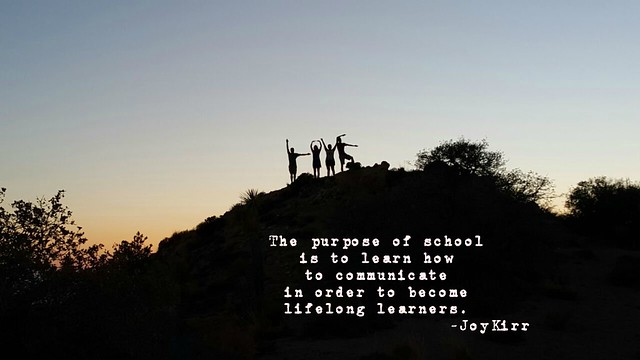Thanks to Joy Kirr for a book that outlines her growth as a teacher over the last six years. I was privileged to meet her on Twitter in 2012. I have learned a lot about her shifts in education through her blog and on Twitter–with her more than 80,000 positive, affirming, and equipping tweets.
However, now there is something even better. She has invited me into both her classroom and her mind for the rich details. How does this look? How can I shift the classroom environment in my own situation? She wrote a book on it, called Shift This, published by Dave Burgess Consulting.
For those who need more specifics on how to create a student-centered classroom environment, this is the easy-to-read, must-read book for you.
Joy begins the book with the beginnings of her journey and a challenging chapter about WHY and HOW questions to ask of your classroom practice. The book continues with chapters on these timely topics:
- Classroom Environment
- Classwork
- Homework
- Grading
- Social Media
- Student-Directed Learning
Finally, Joy ends the book with a chapter called “Resistance.” The opening story, a discussion with a parent asking about homework, is so compelling! It makes me know she has real-life experience with resistance.
Each chapter ends with a Reflection and Call to Action for the reader to write notes about their next steps. In addition, there is a further reading list provided for each chapter.
Joy is so personable and kind. She will always give teachers the benefit of the doubt. If you don’t want to give up your teacher desk, that’s fine, she’ll tell you. “You have to do what works for you…Furniture and walls really aren’t the key to a transformative culture in our classrooms. The key is how we treat students” (Shift This, page 42).
She will always be patient with and give respect to teachers, but when the students’ best interests are in jeopardy, she makes it clear to you. She will always come up on the side of the students. She will influence us, in her kind, personable manner to shift our practice to be more student-centered and student-empowering.
Like Joy, I’ve had more than 20 years teaching experience. I try to be like Joy in another way: Even with her many years of experience, Joy always has something new to learn. In Shift This, Joy consistently models her love for and need for her own personal learning. One thing that spoke to me poignantly was this quote I discovered on her classroom website, which she had linked to in the book. On this Scholars in Room 239 post, I love how she sought advice from parents:
Please help me grow as an educator. Although this is my 22nd year as a teacher, I know I can always do a better job, and I’ve already asked for your child’s feedback. I’d also love your honest feedback.
She’s left a link to an anonymous survey for all the parents of her students. Brava, Joy! You are inspiring us to all be more humble and thriving as educators!
Here are just a few things I’ve gleaned from Shift This for this new school year, which will start in a few weeks. I want to just list them here to help me remember and so I can hold myself accountable:
- Choices of material, length, level and more in independent reading. We’ll take a challenge of how many books to read, rather than the traditional one every two weeks. Students will share their “book reports” in informal book talks with peers and other ways to share books they loved.
- My teacher desk will become a modified student station, as it was last year. I’m trying to take it to another level, though. Still a work in progress.
- Organize my student web page so there are no questions about what we did in class and what is expected of students. Right now, there are still too many unanswered questions on our Grade 5 News page. My excuse: I was new in grade 5 last year. I can’t make that excuse any longer.
- Homework each day will be reading an English book for at least 20 minutes. This will be more intentional and monitored than last year. Last year I gave very little homework, and there was little to no resistance from parents and students. I think it is a good decision.
- Grading is developing in my school, too. Another work in progress that I will continue to push for and develop is standards-based grading, collecting evidence of mastery.
- I will choose a volunteer photographer for each week rather than trying to do it daily as in the past, which didn’t work so well.
Shift This is the kind of book you can read over and over. As you make shifts in your classroom this year, you will see the benefits. Then next summer you will read the book again and see ideas that last summer seemed out of reach. But next fall…you will be ready. (So be sure to date the entries on the Reflection and Call to Action sections. You’ll be back.) On this journey as the chief learner, each fall you will be able to make your classroom a more safe, student-centered, joy-filled, learning-owned-by-students environment.
You can bet, I will return to this book again. For the sake of my students.

